The Basics of Cockatiel Care: Cockatiel Food, Socialization and Habitat
Today we are going to teach you everything you need to know about cockatiel care, food, and training so that your bird stays healthy and happy!
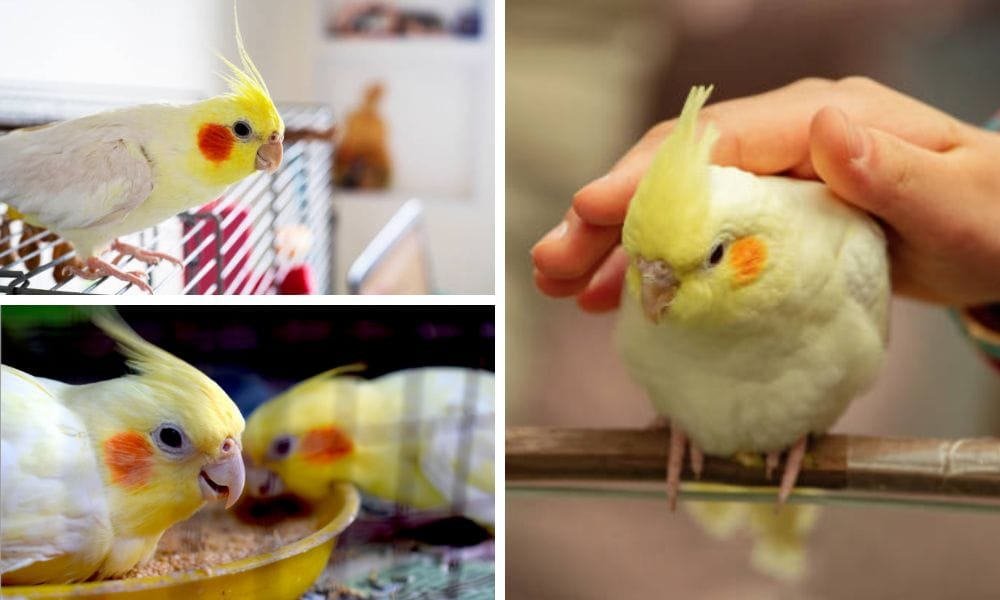
Key Takeaways:
- Proper cockatiel care involves a balanced diet, social interaction, and a suitable habitat.
- Regular visits to an avian veterinarian are crucial for maintaining your pet bird's health.
- Enrichment toys and varied diets are essential for the mental stimulation and happiness of cockatiels.
Introduction
Cockatiels are delightful, intelligent pets that bring joy to many households. However, ensuring they lead a healthy life requires understanding their specific needs. This article will delve into the essentials of cockatiel care, covering their diet, socialization, and habitat requirements.
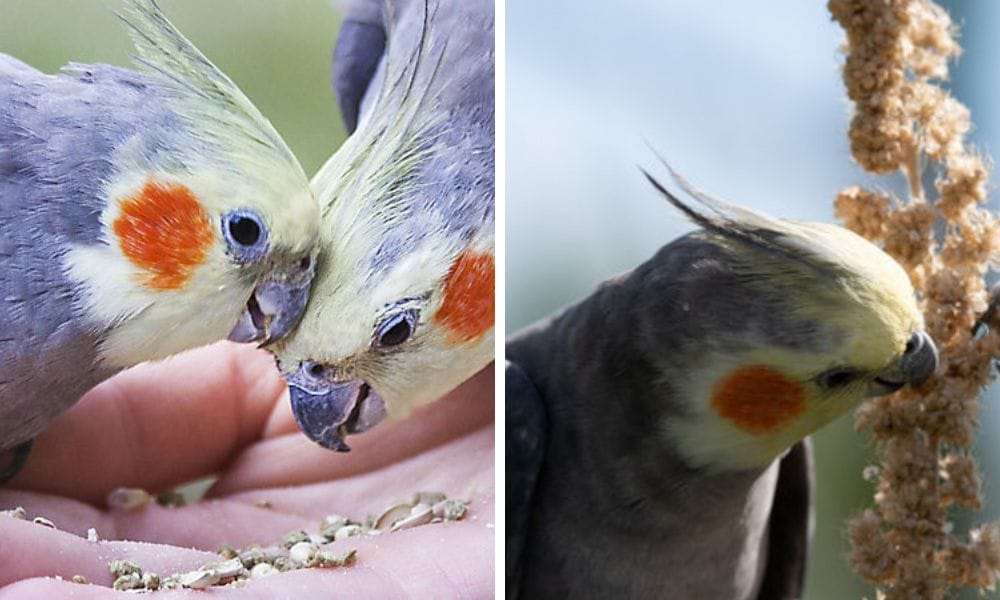
Understanding Cockatiels
Cockatiels belong to the cockatoo family and are known for their distinctive crest feathers. These small parrots are native to Australia, where wild cockatiels thrive in various environments. Understanding their natural behaviors can help you provide better care for your pet cockatiel.
Cockatiels are social birds that enjoy interaction with their human companions and other pets. They are known for their playful nature and can be quite affectionate, making them a popular choice among pet birds. When considering adding a cockatiel to your family, it's advisable to purchase from a reputable bird breeder who hand-feeds and socializes the birds, ensuring they are healthy and well-adjusted.
Cockatiel Behavior and Communication
Cockatiels are known for their playful and curious nature, making them delightful companions. These pet birds communicate in various ways to express their emotions and needs. They use a range of vocalizations, including whistling, chirping, and mimicking sounds they hear around them. Each sound can convey different messages, from seeking attention to expressing contentment.
In addition to vocalizations, cockatiels use body language to communicate. For instance, they may raise their crest feathers when excited or curious, and lower them when feeling threatened or relaxed. Observing these subtle cues can help you understand your cockatiel’s mood and respond appropriately.
Visual displays are another form of communication in cockatiels. During courtship, they may strut or preen to attract a mate or show affection. Conversely, they might use visual signals to warn off potential threats or rival birds. Understanding these behaviors is essential for building a strong bond with your pet bird. By recognizing and responding to their vocalizations and body language, you can create a more harmonious and interactive relationship with your cockatiel.
Cockatiel's Diet
A healthy diet is crucial for your cockatiel's well-being. Cockatiels love a varied diet that includes seeds, pellets, fresh vegetables, and occasional treats like millet sprays. It's important to provide a balanced mix to ensure they get all the vital minerals and nutrients they need.
Fresh food should be offered daily, and food bowls should be cleaned regularly to prevent contamination. Avoid feeding your cockatiel a poor diet, as this can lead to health issues such as weight loss and feather plucking.
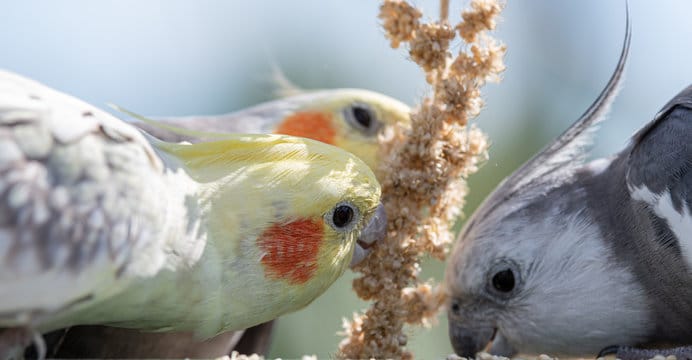
Food and Water Dishes
Choosing the right food and water dishes is essential for maintaining a clean environment. Opt for sturdy, easy-to-clean bowls that can be securely attached to the cage. This prevents spills and ensures your bird has access to fresh food and water at all times.
Water dishes should be changed daily, and it's a good idea to use a clean spray bottle to mist your cockatiel with warm water occasionally. This helps keep their feathers in good condition and mimics the natural rain they would experience in the wild.
Cockatiel Habitat
Creating a suitable habitat for your cockatiel is vital for their happiness and health. The cage size should be spacious enough to allow for movement and exercise. Horizontal bars are preferable as they provide climbing opportunities, which are essential for mental stimulation.
The cage floor should be lined with a safe, absorbent material that can be easily cleaned. Ensure the cage door is secure to prevent escapes, and place the cage in a location where your cockatiel can enjoy direct sunlight but is protected from drafts.
Enrichment Toys
Mental stimulation is crucial for cockatiels, and enrichment toys play a significant role in keeping them entertained. Provide a variety of toys, including soft wood for chewing, mirrors, and bells. Rotate the toys regularly to keep your bird engaged and prevent boredom.
Multiple perches of different sizes and textures should be placed throughout the cage to encourage exercise and foot health. This variety helps prevent foot problems and keeps your cockatiel active. Selecting appropriate perches and toys for your bird's cage is crucial to prevent injuries and provide mental stimulation.
Socialization
Cockatiels are social creatures that thrive on interaction. Spend time with your cockatiel daily, talking to them and offering gentle head scratches. This helps build a strong bond and keeps your bird happy.
If you have other pets, introduce them to your cockatiel gradually and under supervision. This ensures a safe environment for all your animals and prevents any potential stress or aggression.
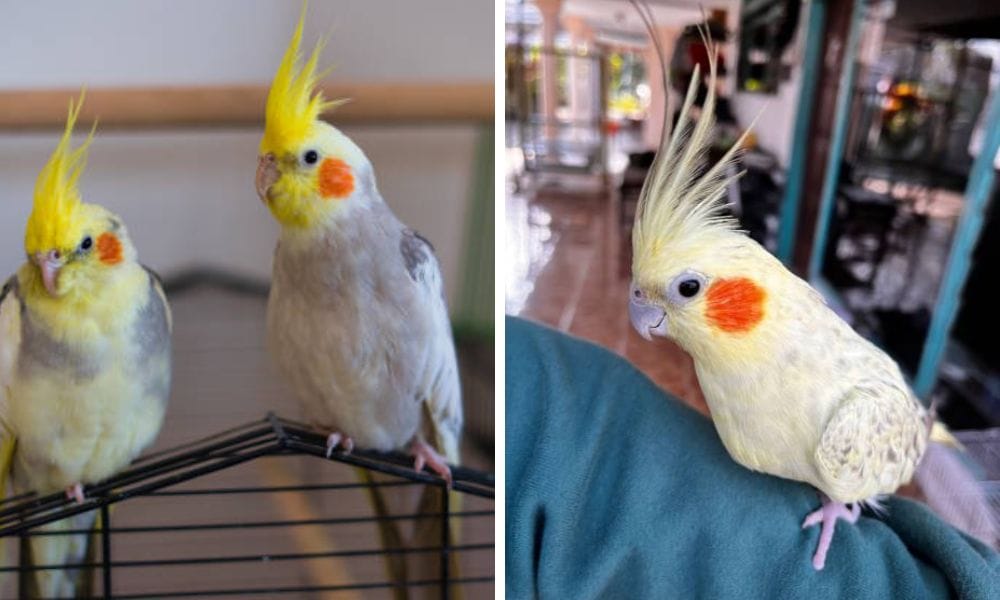
Building Trust with Your Cockatiel
Building trust with your cockatiel is crucial for establishing a strong and loving relationship. Here are some tips to help you build trust with your pet bird:
- Move slowly and calmly: Sudden movements can startle your cockatiel, so it’s essential to move slowly and calmly around them. This helps them feel safe and secure in your presence.
- Offer treats: Offering treats can help your cockatiel associate you with positive experiences. Start with small treats, such as millet or sunflower seeds, and gradually increase the size and variety of treats as they become more comfortable with you.
- Spend time near the cage: Spend time near your cockatiel’s cage, talking to them and letting them get used to your presence. This will help them feel more comfortable and secure, making it easier for them to trust you.
- Let them come to you: Allow your cockatiel to come to you on their own terms. Don’t force them to interact if they’re not in the mood. Patience is key to building a trusting relationship.
- Be patient: Building trust takes time, so be patient and consistent in your interactions with your cockatiel. Over time, your pet bird will learn to trust and enjoy your company.
By following these tips, you can build a strong and trusting relationship with your cockatiel, ensuring they feel safe and loved in their home.
Common Illnesses
Regular check-ups with an avian veterinarian are essential for detecting and preventing common illnesses in cockatiels. Symptoms such as weight loss, feather plucking, and changes in behavior can indicate health issues that require professional attention.
Maintaining a clean environment and providing a healthy diet can help prevent many health problems. Be vigilant and consult your vet if you notice any signs of illness.
Cockatiel's Health
A healthy cockatiel is an active and alert bird. Monitor your pet's health by observing their behavior, eating habits, and physical condition. Regular grooming, including nail trimming and beak care, is also important for their overall well-being.
In case of minor injuries, having styptic powder on hand can help stop bleeding. However, for more serious health issues, always seek the advice of an avian veterinarian.
Cockatiel Home
Creating a comfortable home for your cockatiel involves more than just a cage. Ensure the environment is safe and free from hazards such as toxic plants and open windows. Provide a quiet space for your bird to retreat to when they need rest.
Direct sunlight is beneficial, but avoid placing the cage in areas with extreme temperatures. A balanced environment helps maintain your cockatiel's health and happiness.
Cage Size
The size of your cockatiel's cage is crucial for their well-being. A spacious cage allows for movement and exercise, which are essential for preventing obesity and promoting mental stimulation. Ensure the cage is large enough to accommodate multiple perches and toys.
Horizontal bars are ideal as they provide climbing opportunities, which are important for your bird's physical and mental health. A well-designed cage contributes significantly to your cockatiel's overall happiness.
Fresh Vegetables
Incorporating fresh vegetables into your cockatiel's diet is essential for providing vital nutrients. Leafy greens, carrots, and bell peppers are excellent choices. These vegetables should be washed thoroughly and cut into small, manageable pieces.
Offering a variety of fresh vegetables not only enhances your bird's diet but also provides mental stimulation as they explore new textures and flavors. A healthy diet is key to a long and happy life for your cockatiel.
Cockatiel's Cage
The cage is your cockatiel's primary living space, so it's important to keep it clean and well-maintained. Regularly clean the cage floor and food bowls to prevent the buildup of bacteria and mold. A clean environment is crucial for your bird's health.
Ensure the cage is placed in a location where your cockatiel can interact with the family but also have a quiet space to retreat to when needed. A well-maintained cage contributes to a happy and healthy cockatiel.
Female Cockatiels
Female cockatiels have specific needs, especially during the breeding season. Providing a balanced diet rich in calcium is essential to prevent egg binding, a common health issue in female birds. Ensure they have access to cuttlebone or mineral blocks.
Monitor your female cockatiel closely for signs of egg binding, such as straining or lethargy. If you suspect any issues, consult an avian veterinarian immediately.
Cockatiel's Health
Regular health check-ups are essential for maintaining your cockatiel's well-being. An avian veterinarian can provide valuable insights into your bird's health and offer preventive care to avoid common illnesses.
Maintaining a healthy diet, clean environment, and regular social interaction are key components of proper cockatiel care. A healthy cockatiel is a happy cockatiel.
Bird Safe
Ensuring your home is bird-safe is crucial for your cockatiel's safety. Remove any toxic plants, secure windows and doors, and avoid using non-stick cookware, which can release harmful fumes. A safe environment prevents accidents and health issues.
Regularly inspect your home for potential hazards and make necessary adjustments to create a safe space for your feathered friend. A bird-safe home is essential for your cockatiel's well-being.
Cockatiel's Diet
A balanced diet is the cornerstone of your cockatiel's health. In addition to seeds and pellets, offer fresh vegetables and occasional treats like millet sprays. Avoid feeding your bird a poor diet, as this can lead to health problems.
Providing a varied diet ensures your cockatiel receives all the necessary nutrients for a healthy life. Regularly consult with an avian veterinarian to ensure your bird's diet meets their specific needs.
Cockatiel Happy
A happy cockatiel is one that receives regular social interaction, mental stimulation, and a balanced diet. Spend time with your bird daily, offering head scratches and talking to them. This strengthens your bond and keeps your cockatiel content.
Providing a variety of toys and perches in the cage also contributes to your bird's happiness. A well-cared-for cockatiel is a joyful and affectionate companion.
Cockatiel's Health
Maintaining your cockatiel's health involves regular check-ups with an avian veterinarian, a balanced diet, and a clean environment. Monitor your bird for any signs of illness and seek professional advice if needed.
A healthy cockatiel is an active and alert bird. Regular grooming and proper care are essential for their overall well-being.
Cockatiel's Cage
The cage is your cockatiel's primary living space, so it's important to keep it clean and well-maintained. Regularly clean the cage floor and food bowls to prevent the buildup of bacteria and mold. A clean environment is crucial for your bird's health.
Ensure the cage is placed in a location where your cockatiel can interact with the family but also have a quiet space to retreat to when needed. A well-maintained cage contributes to a happy and healthy cockatiel.
Female Cockatiels
Female cockatiels have specific needs, especially during the breeding season. Providing a balanced diet rich in calcium is essential to prevent egg binding, a common health issue in female birds. Ensure they have access to cuttlebone or mineral blocks.
Monitor your female cockatiel closely for signs of egg binding, such as straining or lethargy. If you suspect any issues, consult an avian veterinarian immediately.
Cockatiel's Health
Regular health check-ups are essential for maintaining your cockatiel's well-being. An avian veterinarian can provide valuable insights into your bird's health and offer preventive care to avoid common illnesses.
Maintaining a healthy diet, clean environment, and regular social interaction are key components of proper cockatiel care. A healthy cockatiel is a happy cockatiel.
Bird Safe
Ensuring your home is bird-safe is crucial for your cockatiel's safety. Remove any toxic plants, secure windows and doors, and avoid using non-stick cookware, which can release harmful fumes. A safe environment prevents accidents and health issues.
Regularly inspect your home for potential hazards and make necessary adjustments to create a safe space for your feathered friend. A bird-safe home is essential for your cockatiel's well-being.
Cockatiel's Diet
A balanced diet is the cornerstone of your cockatiel's health. In addition to seeds and pellets, offer fresh vegetables and occasional treats like millet sprays. Avoid feeding your bird a poor diet, as this can lead to health problems.
Providing a varied diet ensures your cockatiel receives all the necessary nutrients for a healthy life. Regularly consult with an avian veterinarian to ensure your bird's diet meets their specific needs.
Cockatiel Happy
A happy cockatiel is one that receives regular social interaction, mental stimulation, and a balanced diet. Spend time with your bird daily, offering head scratches and talking to them. This strengthens your bond and keeps your cockatiel content.
Providing a variety of toys and perches in the cage also contributes to your bird's happiness. A well-cared-for cockatiel is a joyful and affectionate companion.
Cockatiel Grooming and Care
Cockatiels require regular grooming and care to stay healthy and happy. Here are some essential tips for grooming and caring for your pet cockatiel:
Beak Health and Nail Care
Maintaining your cockatiel’s beak health is crucial. Overgrown beaks can cause discomfort and health problems. Regular beak trimming can prevent overgrowth, and you can either do this yourself with the right tools or take your cockatiel to a professional groomer.
Nail care is equally important. Long nails can lead to discomfort and potential health issues. Regular trimming is necessary, and you can use a nail clipper specifically designed for birds or seek the help of a professional groomer. Keeping your cockatiel’s nails at a proper length ensures they can perch comfortably and move around without any issues.
Feather Care and Bathing
Feather care is essential for your cockatiel’s overall health. Regularly check their feathers for any signs of damage or dirt. You can use a soft-bristled brush or a feather duster to gently remove dirt and debris from their feathers.
Bathing is also an important part of feather care. You can provide a shallow dish of lukewarm water or a birdbath specifically designed for birds. Ensure the water is not too deep, as cockatiels can drown easily. Bathing helps keep their feathers clean and in good condition, mimicking the natural rain they would experience in the wild.
By following these grooming tips, you can keep your cockatiel clean, healthy, and happy, ensuring they look and feel their best. Regular grooming and care are essential for maintaining your pet cockatiel’s well-being.
Summary
Proper cockatiel care involves a balanced diet, social interaction, and a suitable habitat. Regular visits to an avian veterinarian are crucial for maintaining your pet bird's health. Enrichment toys and varied diets are essential for the mental stimulation and happiness of cockatiels.
FAQ
Q1: How often should I clean my cockatiel's cage?
A1: It's important to clean your cockatiel's cage at least once a week. Food and water dishes should be cleaned daily to prevent contamination.
Q2: What should I do if my cockatiel starts feather plucking?
A2: Feather plucking can be a sign of stress or health issues. Consult an avian veterinarian to determine the cause and appropriate treatment.
Q3: Can cockatiels eat fruits?
A3: Yes, cockatiels can eat fruits in moderation. Offer small pieces of fruits like apples, berries, and melons as occasional treats. Avoid feeding them avocado, as it is toxic to birds.
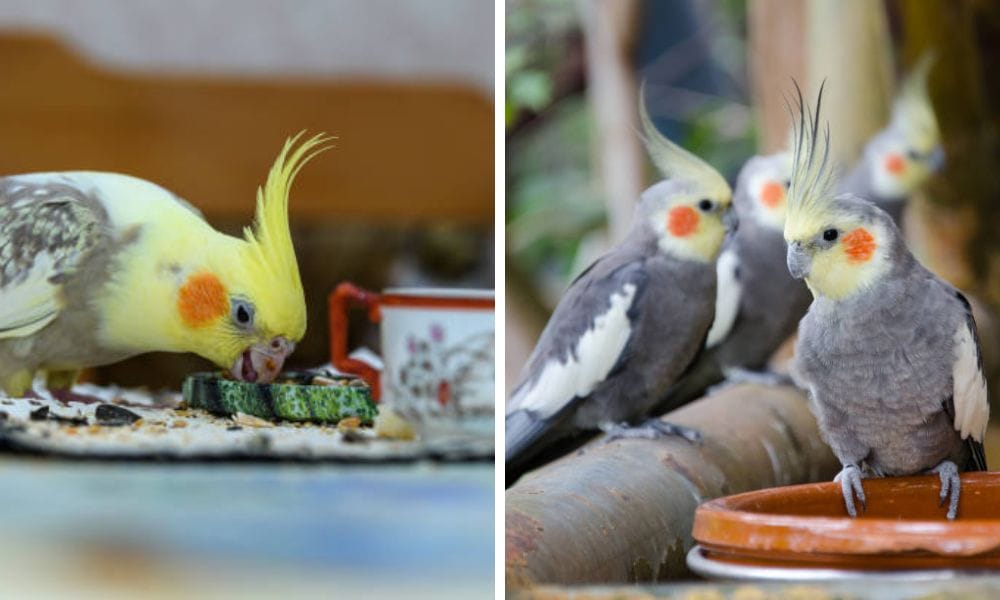
Are you looking for the best food to keep your cockatiel healthy and happy? Look no further! Click the link below to check out the top-rated cockatiel food on Amazon. Reviews from pet owners just like you show that this is the healthiest and tastiest food available on the market right now - why not give it a try? Keep your beloved bird strong, vibrant, and content with this top-notch nutrient source - after giving it a go, we guarantee you won't regret it!
